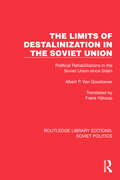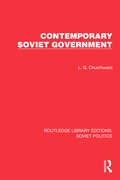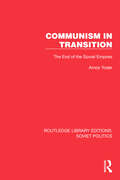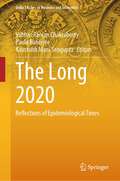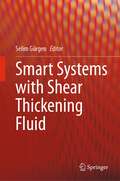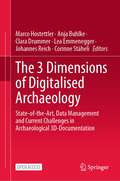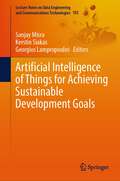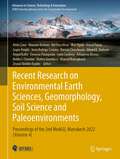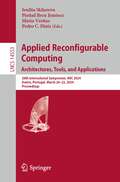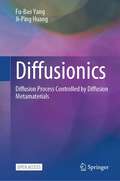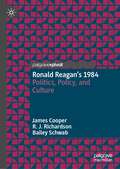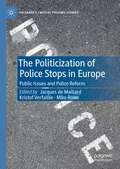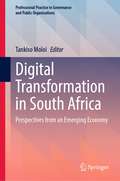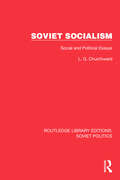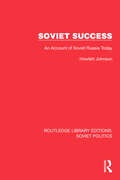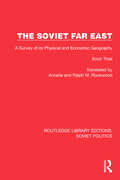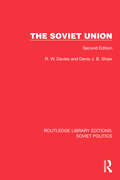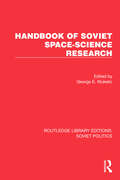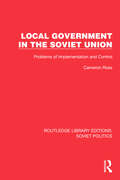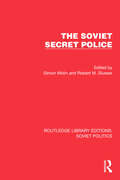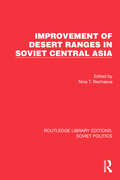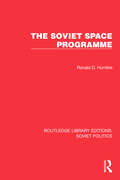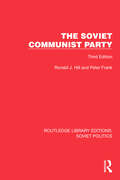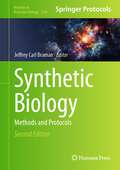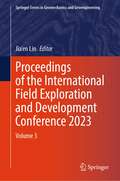- Table View
- List View
The Limits of Destalinization in the Soviet Union: Political Rehabilitations in the Soviet Union since Stalin (Routledge Library Editions: Soviet Politics)
by Albert P. van GoudoeverThe Limits of Destalinization in the Soviet Union (1986) examines the forms, aspects and significance of the phenomenon of rehabilitation in the Soviet Union between 1953 and 1980, when victims of Stalin’s terror were released from camps or posthumously rehabilitated. It describes the political manipulation of the selection of victims qualified for rehabilitation and reinstatement in the Communist Party, and reviews the formal and juridical procedures, as well as looking at the way in which the commemoration of the victims was handled in propaganda and historiography.
Contemporary Soviet Government (Routledge Library Editions: Soviet Politics)
by L.G. ChurchwardContemporary Soviet Government (1975) is a leading study of the practice of Soviet government, examined against a background of Soviet Marxism. It presents an analysis of the Soviet political system since the death of Stalin, and places considerable emphasis on the role of state, as distinct from Party, organisations – as the author contends that these are more important than commonly realised in the West.
Communism in Transition: The End of the Soviet Empires (Routledge Library Editions: Soviet Politics)
by Amos YoderCommunism in Transition (1993) examines the mainstays of Communist ideology, and goes on to look at the collapse of Communism in the Soviet Union, and in Eastern Europe. It also analyses Asian and Latin American Communist systems and their challenges to the non-Communist world, and concludes by evaluating the democratic revolutions in the former Soviet Union and in Eastern Europe, their possible effect on other Communist states, why the revolutions surprised Western pundits, and the implications of these events for world peace.
The Long 2020: Reflections of Epidemiological Times (India Studies in Business and Economics)
by Subhas Ranjan Chakraborty Paula Banerjee Kaustubh Mani SenguptaThis book looks at the current crises of life and livelihood following the global epidemiological crisis and various strategies to manage them as a long unfolding of past trends and future possibilities of epidemiological governance, restructuring of global economy, public health, systems of protection and care and the role of state in that, and precarities of the migrants and the refugees. It brings together scholars from different fields to think of our present in the time of COVID-19 pandemic in a longer temporal frame. The essays compiled in this book investigate issues mentioned above, covering a period from the colonial past to the postcolonial present with an aim towards encouraging scholarly debates on protection, care and justice. Although the experiences of last two years have inspired some very important academic and scholarly interventions, this book compiles original research to contextualise the present in a longue duree framework and arrive at a more complex understanding of it. It is a must-have resource for researchers of developmental studies especially in the above mentioned areas, as well as policy makers, think tanks and other non-governmental organizations interested in these areas.
Smart Systems with Shear Thickening Fluid
by Selim GürgenShear thickening fluid (STF) is a smart material that has been widely used in engineering applications over the last two decades. Its smart behavior, including adaptive viscosity, has found use in many engineering fields. This book provides an introduction to STF and smart systems, presenting cutting-edge technology and offering various case studies and research. It examines how conventional structures or systems can gain smart properties with the integration of STF, such as in magnetorheological materials, energy harvesting applications, battery electrolytes, vibration-damping systems, and surface polishing operations. Smart Systems with Shear Thickening Fluid is an essential resource for anyone working with STFs, and engineers, researchers, and scientists will gain valuable insights into its behavior and how it can be used to tailor rheology for smart applications.
The 3 Dimensions of Digitalised Archaeology: State-of-the-Art, Data Management and Current Challenges in Archaeological 3D-Documentation
by Marco Hostettler Anja Buhlke Clara Drummer Lea Emmenegger Johannes Reich Corinne StäheliThis open access book aims to provide an overview of state-of-the-art approaches to 3D documentation from a practical perspective and formulate the most important areas for future developments. Bringing together a wide range of case studies, examples of best practice approaches, workflows, and first attempts to establish sustainable solutions to pressing problems, this book offers readers current practical advice on how to approach 3D archaeology and cultural heritage.Divided into five parts, this book begins with an overview of 3D archaeology in its present state. It goes on to give insights into the development of the technology and recent cutting-edge applications. The next section identifies current challenges in 3D archaeology and then presents approaches and solutions for data management of a large number of 3D objects and ways to ensure sustainable solutions for the archiving of the produced data. This book will be of interest to researchers working in the fields of archaeology, heritage management, and digital humanities in general.
Artificial Intelligence of Things for Achieving Sustainable Development Goals (Lecture Notes on Data Engineering and Communications Technologies #192)
by Sanjay Misra Kerstin Siakas Georgios LampropoulosThis book covers various topics and trends regarding Artificial Intelligence (AI), Internet of Things (IoT), and their applications in society, industry, and environment for achieving Sustainable Development Goals (SDGs) suggested by the United Nations. Additionally, it discusses their advancements and fusion as well as the realization of Artificial Intelligence of Things (AIoT). The book aims to provide an overview and recent research into the fusion, integration, advancements, and impact of these technologies in the context of SDGs achievement. The topics include the applications of AI, IoT, big data, AI-based and IoT-based cloud computing, machine learning and deep learning techniques, and blockchain among others for achieving SDGs. It also presents findings and discussions on potential application domains, addresses open issues and challenges, offers solutions, and provides suggestions for future research for achieving SDGs. The chapters are clustered, according to particular SDGsor areas of focus, into: i) the realization of AIoT for SDGs, ii) the role of AIoT in achieving society and wellbeing-related SDGs, iii) the fulfillment of industrial sectors, infrastructure, and economy-related SDGs through AIoT, and iv) the use of AIoT to aid natural resources and environment-related SDGs. The book assists researchers, practitioners, professionals, and academicians of various scientific fields in exploring and better understanding these state-of-the-art technologies, their advancements, impact, future potentials and benefits, and their role in successfully achieving SDGs.The book:· Offers an in-depth overview of AIoT for achieving SDGs.· Presents the fusion of AI and IoT for bringing a significant change in everyday life and fulfilling SDGs.· Highlights innovative solutions and results of AIoT integration in several domains for achieving SDGs.· Showcases the influence of AIoT on promoting and improving sustainability in the context of SDGs.· Discusses the issues, benefits, solutions, and impact of AIoT in society, industry, and environment for achieving SDGs.
Recent Research on Environmental Earth Sciences, Geomorphology, Soil Science and Paleoenvironments: Proceedings of the 2nd MedGU, Marrakesh 2022 (Volume 4) (Advances in Science, Technology & Innovation)
by Attila Çiner Maurizio Barbieri Md Firoz Khan Ilker Ugulu Veysel Turan Jasper Knight Jesús Rodrigo-Comino Haroun Chenchouni Ahmed E. Radwan Amjad Kallel Dionysia Panagoulia Carla Candeias Arkoprovo Biswas Helder I. Chaminé Matteo Gentilucci Mourad Bezzeghoud Zeynal Abiddin ErgülerThis book is based on the accepted papers for presentation at the 2nd MedGU Annual Meeting, Marrakesh 2022. The book presents a series of newest research studies that are nowadays relevant to Middle East, Mediterranean region, Africa, and surrounding areas. The book gives a general overview on current research, focusing on geoenvironmental issues and challenges in environmental management in these regions. It offers a broad range of recent studies that discuss the latest advances in geography, geomorphology, landslides, and soil science, in addition to geoarchaeology and geoheritage. It also shares insights on some glaciology studies. The book also enhances the understanding of paleoclimate and paleoenvironmental changes based on research studies from the fields of marine geosciences, historical geology, and paleoceanography and paleoclimatology.
Applied Reconfigurable Computing. Architectures, Tools, and Applications: 20th International Symposium, ARC 2024, Aveiro, Portugal, March 20–22, 2024, Proceedings (Lecture Notes in Computer Science #14553)
by Iouliia Skliarova Piedad Brox Jiménez Mário Véstias Pedro C. DinizThis LNCS conference volume constitutes the proceedings of the 20th International Symposium, ARC 2024, in Aveiro, Portugal, in March 2024. The 16 full papers together with 5 papers from the technical program included in this volume were carefully reviewed and selected from 24 submissions. The conference focuses on the application and development of reconfigurable computing techniques, fault-tolerance, data, and graph processing acceleration to computer security.
Diffusionics: Diffusion Process Controlled by Diffusion Metamaterials
by Fu-Bao Yang Ji-Ping HuangThis open access book presents a comprehensive exploration of diffusion metamaterials that control energy and mass diffusion. Currently, if from the perspective of governing equations, diffusion metamaterials and wave metamaterials (pioneered by J. B. Pendry in the 1990s) are recognised as the two most prominent branches in the field of metamaterials. These two branches differ in their emphasis on the diffusion equation (as the governing equation) and time-dependent characteristic lengths in diffusion metamaterials, as opposed to the wave equation (as the governing equation) and time-independent characteristic lengths in wave metamaterials. Organized into three distinct parts – 'Thermal Diffusion Metamaterials', 'Particle Diffusion Metamaterials', and 'Plasma Diffusion Metamaterials' – this book offers a rigorous exploration spanning physics, engineering, and materials science, aimed at advancing our understanding of diffusion processes controlled by diffusion metamaterials. Incorporating foundational theory, computational simulations, and laboratory experiments, the book equips researchers and scholars across these disciplines with comprehensive methods, insights, and results pivotal to the advancement of diffusion control. Beyond facilitating interdisciplinary discourse, the book serves as a catalyst for innovative breakthroughs at the crossroads of physics, thermodynamics, and materials science. Essentially, readers will acquire profound insights that empower them to spearhead advancements in diffusion science (diffusionics) and the engineering of metamaterials.
Ronald Reagan’s 1984: Politics, Policy, and Culture
by James Cooper R.J. Richardson Bailey SchwabForty years after Ronald Reagan’s successful re-election campaign, this book explores the significance of the year 1984 in the making of Reagan’s presidential record and the shaping of his legacy. The authors examine the broader context of how Reagan impacted the nature of the US presidency and international relations during the Cold War, and how this in turn interacted with American popular culture. Serving as an introduction to academics, students and the interested public into what is a rapidly increasingly Reagan scholarship, this book will also appeal to anyone interested in US elections, the evolving nature of the US presidency, and American culture more generally.
The Politicization of Police Stops in Europe: Public Issues and Police Reform (Palgrave's Critical Policing Studies)
by Jacques De Maillard Kristof Verfaillie Mike RoweThis book examines the timely issue of police stops as a public and political issue, focussing on the European states. Contrary to much other work it focuses on wider Europe and the social and political context in which the police practice of stopping citizens emerges, develops and can be curtailed. More specifically, the volume analyses public controversies about police stops, i.e. events in which conflicts emerge about how the performance of police stops is explained and justified. This book stems from an EU COST Action research network on Police Stops which engages academics and practitioners from 29 countries. It appeals to those in law, criminology and policing studies with some potential for wider interest in cultural studies/history and public policy/politics, as well as to practitioners in police scrutiny, oversight and other professional bodies and in training organisations.
Digital Transformation in South Africa: Perspectives from an Emerging Economy (Professional Practice in Governance and Public Organizations)
by Tankiso MoloiThis book examines the adoption of digital technologies in different sectors in South Africa. The authors investigate how digital innovation impacts development in various areas in the public and private sectors. Chapters in the book cover digital transformation in authorities and government bodies and how this transforms governance, this includes digital transformation for good governance in the public sector, tax authorities, local government, and traditional authorities. The second set of chapters emphasizes the digital transformation of business corporations, such as digital transformation lessons for small businesses, digital transformation of finance, and the banking sector. Other chapters delve into enterprise processes such as auditing, corporate reporting, good corporate reputation, enterprise risk management, and marketing environment. The book will appeal to an audience of scholars and professionals wanting to understand more about the role of digital transformation in emerging economies and how innovation influences economic growth.
Soviet Socialism: Social and Political Essays (Routledge Library Editions: Soviet Politics)
by L.G. ChurchwardSoviet Socialism (1987) is based on the author’s specialized knowledge of many aspects of Soviet politics, including local government, the Communist Party and the Soviet intelligentsia. Written originally after the death of Brezhnev, in the Andropov-Chernenko interregnum, the essays were revised to take account of the accession to power of Mikhail Gorbachev, and they cover a selection of interrelated themes drawn from Soviet politics and society. The detached view the author takes of the Soviet state presents a new and stimulating approach to Soviet studies.
Soviet Success: An Account of Soviet Russia Today (Routledge Library Editions: Soviet Politics)
by Hewlett JohnsonSoviet Success (1947) deals with Soviet Russia after the Second World War. The author met Stalin, Molotov and other leading personalities in Russia, and here records his conversations with them in full detail. The book looks at the destruction caused by the war, and the state of the economy and political life in its aftermath. It also is particularly informative on the family, art, literature and cultural life of Soviet Russia.
The Soviet Far East: A Survey of its Physical and Economic Geography (Routledge Library Editions: Soviet Politics)
by Erich ThielThe Soviet Far East (1957) examines the Soviet economic and political development of the Russian Far East between Lake Baikal and the Pacific, as it gained importance as the geographic base of Soviet power in the Far Eastern theatre of international politics and strategy.
The Soviet Union: Second Edition (Routledge Library Editions: Soviet Politics)
by R. W. DaviesThe Soviet Union (1989) examines the state of the Soviet Union at the end of the 1980s. The Soviet Union claimed to offer a new social, economic and political order – a planned socialist system – and this book looks at the Soviet alternative and the extent of its success. It surveys the major components of Soviet society and examines the principal issues and debates that surround its assessment.
Handbook of Soviet Space-Science Research (Routledge Library Editions: Soviet Politics)
by George E. WukelicHandbook of Soviet Space-Science Research (1968) provides a comprehensive and authoritative English language summary of Soviet space-science research of the 1960s.
Local Government in the Soviet Union: Problems of Implementation and Control (Routledge Library Editions: Soviet Politics)
by Cameron RossLocal Government in the Soviet Union (1987) analyses the Soviet Union’s limited success in improving local government between in the 1960s to 1980s, as the country made a drive toward centralized policy control. It examines the institutional framework and changes in crucial policy areas, and argues that a fragmented vertical power structure involving the three bureaucracies of Party, ministries and the city and regional soviets was unproductive. It shows how group interests moulded and adapted policies and how the Party’s initiative in centralizing policy was thwarted. It also outlines the significance of the industrial base in determining local budgets and the provision of amenities, as opposed to overtly political factors.
The Soviet Secret Police (Routledge Library Editions: Soviet Politics)
by Simon WolinThe Soviet Secret Police (1957) depicts the main aspects of the development, structure and functions of the secret police of the Soviet Union. Much of the information contained within comes from the personal testimony of Soviet citizens who had experienced various activities of the secret police, and forms a full and objective study of the secret police and its role in the Soviet system.
Improvement of Desert Ranges in Soviet Central Asia (Routledge Library Editions: Soviet Politics)
by Nina T. NechaevaImprovement of Desert Ranges in Soviet Central Asia (1985) examines the progress made in the Soviet Union’s attempts to increase desert vegetation without using irrigation or fertilizers. Prominent Soviet scientists show that by making use of ecological resources alone – particularly moisture reserves and mineral nutrients available in the root zone of the soil – desert ranges worldwide can be made into more productive grazing land.
The Soviet Space Programme (Routledge Library Editions: Soviet Politics)
by Ronald D. HumbleThe Soviet Space Programme (1988) presents a comprehensive over-view of the Soviet space programme from its beginnings up to the end of the 1980s. One important theme explored is the degree to which the Soviet space programme was oriented towards military capabilities. The book concludes that the degree of military involvement was indeed high.
The Soviet Communist Party: Third Edition (Routledge Library Editions: Soviet Politics)
by Ronald J. Hill Peter FrankThe Soviet Communist Party (1986) provides a concise and accessible description, analysis and assessment of the Communist Party of the Soviet Union (CPSU) and its place in the Soviet political system. It covers the Party’s structures, membership, personnel and functions, and relations with the state institutions, and discusses the Party’s role in leading other institutions and the press, and the part it plays in foreign relations. The book concludes with an examination of the CPSU in terms of a number of concepts that have been applied to it – as an elite, a class, a ‘totalitarian leader’s following’.
Synthetic Biology: Methods and Protocols (Methods in Molecular Biology #2760)
by Jeffrey Carl BramanThis second edition provides new and updated techniques and applications associated with synthetic biology. Chapters guide readers through the creation and regulation of gene circuits, manipulation of biochemical pathways, genome editing and modification, creating genome language and computing, as well as molecular assembly.Written in the highly successful Methods in Molecular Biology series format, chapters include introductions to their respective topics, lists of the necessary materials and reagents, step-by-step, readily reproducible laboratory protocols, and key tips on troubleshooting and avoiding known pitfalls. Authoritative and cutting-edge, Synthetic Biology: Methods and Protocols, Second Edition aims to ensure successful results in the further study of this vital field.
Proceedings of the International Field Exploration and Development Conference 2023: Volume 3 (Springer Series in Geomechanics and Geoengineering)
by Jia’en LinThis book focuses on reservoir surveillance and management, reservoir evaluation and dynamic description, reservoir production stimulation and EOR, ultra-tight reservoir, unconventional oil and gas resources technology, oil and gas well production testing, and geomechanics. This book is a compilation of selected papers from the 13th International Field Exploration and Development Conference (IFEDC 2023). The conference not only provides a platform to exchanges experience, but also promotes the development of scientific research in oil & gas exploration and production. The main audience for the work includes reservoir engineer, geological engineer, enterprise managers, senior engineers as well as students.
